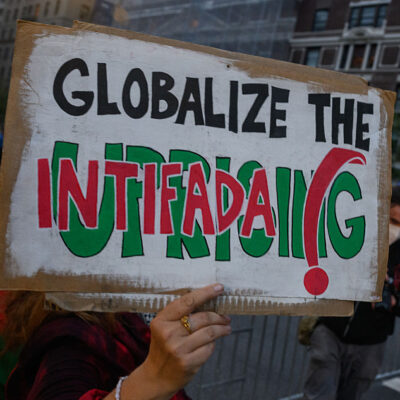Your Daily Phil: Giving USA survey shows inflation’s dampening effect on philanthropy
Good Tuesday morning!
Here’s one way inflation is weakening philanthropy in the United States: A new survey of the field shows that while the raw dollars given to a variety of causes increased last year, trends remained relatively flat in terms of real value.
According to the just-released 2022 Giving USA survey, the definitive annual survey of American philanthropy, the nearly $485 billion donated in the United States in 2021 represents a 4% increase over the 2020 total — but due to inflation, it’s effectively the same amount.
That also holds true regarding giving to specific fields, or by subgroups of people. Donations to human services organizations, for example, rose more than 2% in raw numbers but declined more than 2% when adjusted for inflation.
Giving USA, an annual report commissioned by a foundation of the same name and conducted by Indiana University’s Lilly Family School of Philanthropy at IUPUI, has been publishing its findings for more than six decades. Ahead of today’s release, eJewishPhilanthropy obtained some of its key results. It arrives at its conclusions through economic analysis and by looking at tax data, economic indicators and demographics.
Another trend that influenced giving last year was the stock market’s then-strong performance, which led to growth in corporate giving and donations to donor-advised funds, which are typically used by wealthy donors. In a year when, after inflation, corporate pre-tax profits grew 31%, giving by corporations spiked 18.3%. And while donations by foundations declined slightly year over year, they accounted for a record 19% of total giving.
Individual giving was the main driver of charity, accounting for two-thirds of total donations. “Megagifts” of $450 million or more by ultra-wealthy Americans accounted for some 5% of total donations and a total of nearly $15 billion in philanthropy.
“Robust economic growth translated to strong performance by institutional forms of philanthropy such as foundations and corporations,” Amir Pasic, the Lilly School’s dean, said in a statement. “Yet these economic indicators may differ from what most people experience in daily life. The broader effects of the pandemic may have shifted individual jobs, incomes, lifestyles and family and financial priorities.”
In terms of where the money went, donations to arts and culture groups rose nearly 22% from 2020 when adjusted for inflation, while giving to environmental and animal groups, as well as to health causes, also rose. Perhaps most relevant to Jewish philanthropy, giving to religion was flat when adjusting for inflation, while giving to education fell. Giving to international affairs groups was also flat.
Donations to public-society benefit organizations (anything from a donor-advised fund to a civil rights group to, say, a Jewish federation) rose nearly 18%. Patrick M. Rooney, Lilly’s executive associate dean for academic programs, said that growth was driven by DAFs.
“Growth in this subsector aligns with increased support for legal rights and voting nonprofits, but it is most strongly driven by giving to national donor-advised funds,” Rooney said in a statement, also attributing the rise to “the growth in the stock market more generally in the past two years.”
DYING SEA
As the Dead Sea shrinks, an Israeli is building a museum to remember it — and maybe help avert its demise

Courtesy of Ari Fruchter
Ari Fruchter, an Israeli-American former tech executive and art aficionado, wants to prove he’s worth his salt – by working to halt the dramatic shrinkage of the Dead Sea. Fruchter has spearheaded many projects to save the saltiest sea in the world, situated 1,400 feet below sea level, from co-founding an educational nonprofit to staging a 300-person nude photo shoot on the sea’s beaches.
None of it has worked, so in 2019, Fruchter had a new, and grim, idea: Build an art museum both to inform the public about the environmental issues affecting the sea – and to serve as a permanent monument to a landmark that may soon be no more than a puddle, reports Lev Gringauz for eJewishPhilanthropy.
From tech to art: After quitting a tech career that included stints at SanDisk and Microsoft, Fruchter, 51, is focusing full-time on raising $30 million for a capital campaign to build the Dead Sea Museum of Art. The museum will be located in Arad, Israel, about 17 miles from the sea, on five and a half acres donated by the city. As a proof of concept, the “museum” already exists online, where it displays virtual exhibitions.
Dire situation: An Israeli government report on efforts to save the sea, released this week, paints a dire picture of what’s to come. The report says that “the current situation and predictions of the future depict the Dead Sea as a disaster-stricken area.” It recommends pumping water into the sea to stabilize its surface level, and reducing industrial activity in the area, including the pumping of water from the sea.
A better job: “We happen to be caretakers of it, living in this part of the world, but we don’t own the Dead Sea,” Fruchter told eJP. “I feel Israel should have done a better job taking care of it. And I’m stepping in, where they fell, to go ahead and to invest in it, to make sure that we’re going to be able to appreciate it and learn from it forever.”
WHERE THE MONEY GOES
Giving USA 2021: What we learned

iStock
“Each year, Giving USA, the annual report of philanthropy, offers a picture of current trends in the philanthropic marketplace, with a window into what is to come. In so many ways, 2021 seemed like a year of transition — particularly as many hinted at cautious optimism emerging from the COVID crisis, and a return to more long-term strategic giving versus short term emergency funding,” writes Avrum Lapin, president of The Lapin Group, in an opinion piece for eJewishPhilanthropy.
Number of nonprofits is growing: “One trend that received much attention over the last several years, especially in the wake of COVID affecting the operational budgets of many organizations, and a legacy of the Great Recession of 2008-2009, was the notion of mergers for efficiency, to counter overlapping and competing missions and to integrate operations. However, while this may have been upon the lips of many, the data does not support that it was acted upon at the same level. In 2020 there were close to 650,000 more 501(c)(3)s than in 2019 — an upward trend that has continued since 2013.”
Giving to religion: “While giving to religious causes and institutions still maintains its place as the largest piece of the pie at 29%, this is but half of what we saw 20 years ago where this category enjoyed 58% of overall charitable giving. This shift, by far, reflects the largest change of any giving category over this period. While the change has not been as extreme over the past two years, as giving to faith-based institutions and organizations increased slightly in current dollars, it has, when adjusting for inflation, stayed relatively flat.”
Worthy Reads
Gift of Cleanliness: Caregivers at the Sanatorium, a facility in Poland for Ukrainian refugees, had a problem—just one toilet, one sink and one shower for 30 or more refugees—until a private philanthropist stepped in to support sanitation needs, Susan Barnett writes in Inside Philanthropy: “The most forgotten need — basic sanitation — and the most forgotten people, far too often go hand-in-hand… The management of the Sanatorium set out to solve the problem. They drew up plans and had a contractor in place to build three additional toilets, two showers, and two sinks. What stood in the way was obtaining $25,000 that could be put to work immediately. That’s hard to come by — funding unencumbered by bureaucracy and red tape. Then a private philanthropist who understands the critical need for water, sanitation and hygiene (WASH) was made aware of the situation and without a moment’s hesitation, he underwrote the one-off project, though this kind of endeavor is outside the scope of his foundation.” [InsidePhilanthropy]
Mogul Mentions Mentors: During the Motion Picture & Television Fund’s 100 Years of Hollywood: A Celebration of Service event, the honoree, Hollywood mogul Jeffrey Katzenberg, gave shoutouts to his philanthropic mentors, including the late Kirk Douglas, David Geffen and the late Edie and Lew Wasserman, calling them “some of the world’s greatest givers.” He also recalled his father’s habit of slipping cash to people who needed help, Chris Gardner writes in The Hollywood Reporter. “His father Walter, ‘a very successful, man-about-town stockbroker,’ always carried a wad of discreetly folded $100 bills. As he moved through the day, Walter would ‘quietly and stealthily’ slip one to people in his orbit, whether it be ‘a doorman, a waiter, a valet, someone standing on the street with a sign about needing help, a maid, a taxi driver, a guitarist on a corner…’ One day, Jeffrey asked his father to explain the generous habit. ‘He asked me if I ever looked behind us. I said, ‘No,’ and he said, ‘Well, the next time we’re out together, please look back and tell me what you see,’ Jeffrey recalled from the stage [at the event] ‘The next day, I looked behind us as he subtly and smoothly just handed someone a bill, and he asked me what I saw. ‘I see very big smiles and incredible happiness.’” [THR]
Community Comms
Move forward in your Jewish community career. Discover Spertus Institute’s MA in Jewish Professional Studies. Fellowship funding available. Preferred admissions through June 30.
Be featured: Email us to inform the eJP readership of your upcoming event, job opening, or other communication.
Word on the Street
Israel will likely hold its fifth round of elections in three years this coming fall after its government announced on Monday that it would voluntarily dissolve. The governing coalition, which is led by Prime Minister Naftali Bennett and includes eight parties from across the political spectrum, came together last spring to unseat longtime Prime Minister Benjamin Netanyahu. It has been in power only a year, and recently lost its razor-thin parliamentary majority after facing rebellions from a handful of different lawmakers.
Under the terms of the coalition agreement, Foreign Minister Yair Lapid will become interim prime minister until a new government is sworn in. Elections are expected in October, following the fall’s Jewish holidays…
Russian journalist Dmitry Muratov auctioned off his Nobel Peace Prize medal Monday night. The $103.5 million in proceeds will go to UNICEF’s efforts to help children displaced by the war in Ukraine. He had previously announced he was donating the prize’s $500,000 cash award to charity…
Rothschild Foundation Hanadiv Europe has launched two new websites dedicated to European Jewish archives and Jewish ritual objects: Yerusha.eu, an online catalog providing extensive information on European Jewish archival heritage, and JudaicaIndex.org, a comprehensive inventory of 200 Jewish ritual objects found in synagogues or Jewish homes around the world…
The Future of Jewish Education in the UK, a working group of educators convened by the London School of Jewish Studies and the United Jewish Israel Appeal, released findings about how to move the field forward after COVID-19, including recommending that communities “seriously invest further and deeper in Jewish education”…
The Omidyar Network announced an $11 million competition seeking transformative solutions that will help build a more equitable data future…
Pic of the Day

OREN BEN HAKOON/AFP via Getty Images
Israeli Prime Minister Naftali Bennett (left) and Foreign Minister Yair Lapid jointly address the media on Monday. Bennett said that Lapid “will soon take over” as premierafter the pair agreed to dissolve their fractious governing coalition, a move that triggers new elections expected in the fall.
Birthdays

ELAD GUTMAN PHOTOGRAPHY
Former member of the Knesset where she was the first-ever Druze woman, she is now a Jewish Agency emissary in Washington, D.C., Gadeer Kamal Mreeh…
Former member of the U.S. House of Representatives, mother-in-law of Chelsea Clinton, Marjorie Margolies… Investment banker, he is a former U.S. Ambassador to El Salvador, Charles L. Glazer… Philanthropist and vice-chair of the Museum of Jewish Heritage, Ingeborg Hanna Rennert… British businessman, co-founder with his brother Charles of advertising agency Saatchi & Saatchi, appointed to the House of Lords in 1996, Baron Maurice Saatchi… UK cabinet minister in both the Thatcher and Major governments, Sir Malcolm Leslie Rifkind… Creditors’ rights attorney at Chicago-area Blitt & Gaines, David Stephen Miller… Retired managing editor and writer at The Washington Post, Peter Perl… Member of the Knesset for the Yesh Atid party since 2013, he was appointed as speaker of the Knesset one year ago, Mickey Levy… Susan Gutman… CEO of Amir Development Company in Beverly Hills, Keenan Wolens… Punk rock singer and songwriter, known as the Gangsta Rabbi, Steve Lieberman… Washington Institute fellow and adjunct professor at Johns Hopkins SAIS, David Makovsky… Senior editorial manager at the Aspen Institute, David L. Marcus… Co-founder and executive editor of Axios, Mike Allen… National education policy reporter for The Washington Post, Laura Meckler… Director of strategy and partnerships at Tablet Magazine, Tanya Rebecca Singer… Yale Law School graduate, journalist and author, Abigail Krauser Shrier… Public affairs consultant based in Manhattan, Sam Nunberg… Co-founder and CEO of Kaggle, Anthony Goldbloom… Director of publicity at Netflix, Jackie Berkowitz… Chief of staff to the chairman and CEO at Saban Capital Group, Amitai Raziel… Israeli classical pianist, Boris Giltburg… Executive director at Hunter Hillel, Merav Fine Braun… Editor for programming and social media at “CNN Politics,” Madeleine Morgenstern… Singer-songwriter known as Jeryko, Yaniv Hoffman… Singer-songwriter and actor, Max Schneider…
Email Editor@eJewishPhilanthropy.com to have your birthday included.


 Add EJP on Google
Add EJP on Google






